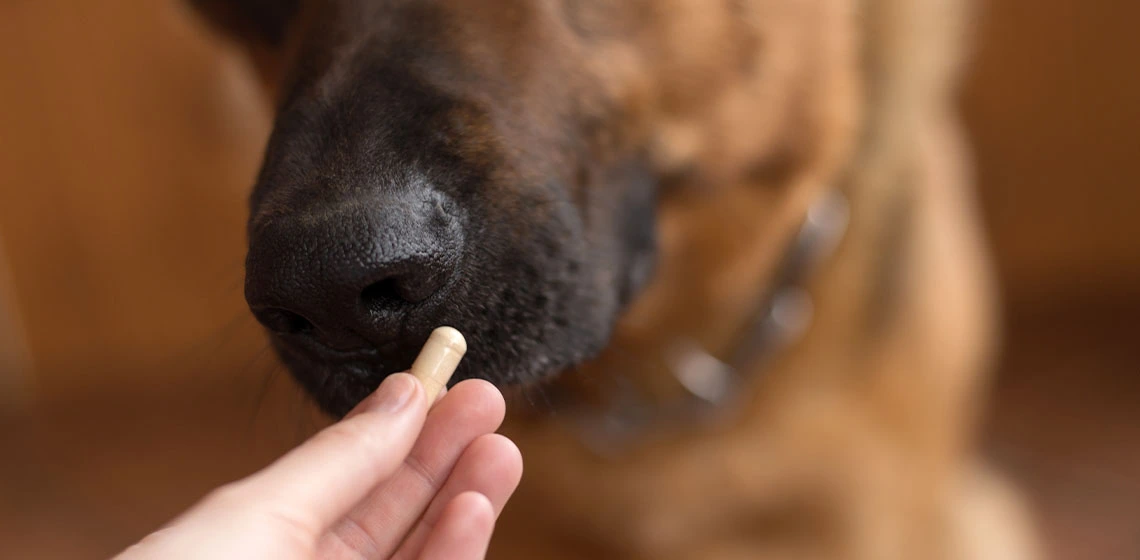Table of Contents
What is Hydrocodone?
Hydrocodone is an opioid, like Morphine, that can be utilized to treat coughing caused by respiratory conditions in dogs. The drug is a controlled Class II substance and can only be prescribed by a veterinarian with a valid DEA license.
Hydrocodone works on receptors in the brain to directly suppress the cough reflex. Clinical effects are seen within 2 hours of dosing and last 6-12 hours.
When is Hydrocodone prescribed?
Hydrocodone is prescribed as an antitussive for cough secondary to certain respiratory conditions. This means that there is a primary reason that the dog is sick, and the secondary symptom is the cough.
Respiratory conditions that may cause coughing are collapsing trachea, bronchitis and kennel cough (CIRDC). All three disease complexes present with coughing as a main symptom. Your veterinarian will perform diagnostic tests to determine what the definitive diagnosis is. Blood work, radiographs and exam findings help differentiate between these conditions.
Collapsing Trachea: This is a condition that is often found in middle age to older dogs, and it presents with a persistent, dry cough. Essentially, the rings of the trachea that give it structure become less rigid, and this allows the trachea to change shape and cause irritation. There are surgical and medical management options to help treat this condition.
Bronchitis: This is a chronic condition found in middle age to older dogs. It is an inflammatory disease that results in an increase in mucus production in the upper and lower airways. Bronchitis is a diagnosis of exclusion, meaning that other causes of chronic cough must be ruled out before determining bronchitis as the definitive diagnosis.
Canine Inflammatory Respiratory Disease Complex (CIRDC): Also known as, “Kennel Cough”, CIRDC is a common infectious cause of a dry, hacking cough. It can affect dogs of any age that have been exposed to other dogs. CIRDC is most often a “mixed bag” of bacterial and viral antigens that cause respiratory disease. Often, the disease is self-limiting and can be fought off by the dog’s immune system. But, if the cough is intense or the dog has comorbidities, your veterinarian will reach for antibiotics to treat. Antitussives are also helpful if the dog is excessively coughing.
What is a recommended Hydrocodone dosage for dogs?
Hydrocodone is a controlled substance, and all dosages are dependent on the weight of your dog and the severity of disease. Your veterinarian will administer the appropriate dose in each situation. There are some drugs that should not be combined with Hydrocodone, so it is important to give the full medical history and drug details to your vet.
What are side effects of Hydrocodone?
Opioids can have effects on the Central Nervous System (CNS), cardiac, respiratory and gastrointestinal systems and therefore should not be used in patients with underlying conditions affecting these systems. Hydrocodone should not be used in patients with trauma or respiratory distress as it can mask symptoms and delay appropriate diagnosis.
Side effects can include sedation, constipation, vomiting or other gastrointestinal disturbances. As mentioned, it can mask symptoms of other respiratory diseases so should not be used in lieu of appropriate treatments for the underlying cause of the cough. For example, if your dog was suffering from bacterial pneumonia, it would not be prudent to start hydrocodone alone. It is imperative that the bacterial infection be treated with antibiotics and pain be treated appropriately. Hydrocodone can be used in addition to these other drugs, but not alone.
Can Hydrocodone be used for pain control?
Hydrocodone has not been shown to have a very high level of pain control. It has been used post-operatively in orthopedic patients in conjunction with Acetaminophen to help with pain. There are not a lot of studies showing its efficacy, so it is difficult to assess whether its use in these situations is beneficial. Sometimes it is used when other pain control modalities are not an option.
Summary
- Hydrocodone is used to treat dry, harsh coughs in dogs
- Hydrocodone is a controlled substance and must be prescribed by a licensed veterinarian
- Hydrocodone helps treat the cough symptom, but it does not cure the disease
- If combined with Acetaminophen, it can be fatal to cats and ferrets
FAQ
Hydrocodone has been shown to be safe in dogs at appropriate doses. As mentioned above, its use should be based on whether the dog has other conditions that would be affected by this drug. It is also important to note that if you are using a Hydrocodone product with Acetaminophen, you should never allow access to this drug to cats or ferrets. Acetaminophen can be fatal in these animals.
Hydrocodone is used in people to treat chronic pain conditions and is safe if used appropriately. There is a chance of abuse and addiction so use must be monitored closely.
Yes, dogs can take hydrocodone for pain in certain situations. Hydrocodone + Acetaminophen is sometimes used post-operatively following orthopedic procedures. There is not a great deal of evidence for its pain control and there are often better options for pain management.

Dr. Shana Schank, DVM, is a veterinarian with 15 years of clinical experience. She has worked as an equine veterinarian, a mixed animal vet and most recently in shelter medicine.








